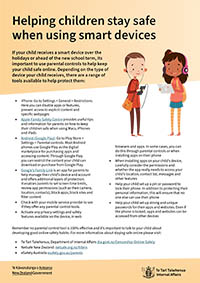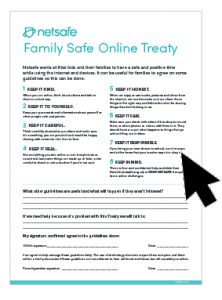- DIGITAL SAFETY
- ABOUT THE DIGITAL SAFETY GROUP
- REPORT HARMFUL ONLINE CONTENT
- CLASSIFICATION IN NEW ZEALAND
- LEGISLATION
- OBJECTIONABLE & RESTRICTED MATERIAL
- ONLINE SAFETY
- For support and help line services
- Online digital child exploitation
- Child safety online
- Voluntary Principles to Counter Online Child Sexual Exploitation and Abuse
- Social media platforms
- Code of Practice for organisations
- Review internet activity
- How to keep your family safe online
- Glossary of internet jargon
- Youth and porn resources
- Other Useful links
- INTERNET & WEBSITE FILTER
- NEWS & RESOURCES
- RESEARCH
- CONTACT US
Child safety online
There are a lot of benefits for children and teenagers online, but they can also be targets of crime and exploitation. It is important to educate children and help them develop online safety skills so they can navigate the internet in a safe, happy and healthy way.
There are a number of safety risks your child may have to deal with online. Teenagers are more vulnerable online as they often use the computer unsupervised and are natural risk takers.
It is important to remember that the number of cases of children being abused online are relatively infrequent. Technology is an integral part of our lives now and the fact that crimes are being committed online is not a reason to avoid using these services. Instead, we need to equip children with the necessary skills to help them safeguard themselves from any potentially dangerous situations online.
Some risks children and young people may encounter online include:
- Inappropriate material – exposure to inappropriate material of a sexual or violent nature that can cause significant emotional and physiological distress (netsafe.org.nz/upsetting-content)
- Online pornography –intentionally or unintentionally coming across pornography which can be very distressing and confusing for children.
- Grooming – when an individual tries to build a relationship with a young person so that they can sexually exploit them in some way. In some cases, paedophiles use online platforms to gain a child's confidence before arranging a face-to-face meeting
- Cyberbullying – receiving abusive or hurtful messages, images or videos or being excluded or humiliated online by peers. This can lead to feelings of vulnerability, isolation, depression and anxiety.
Online grooming
The internet provides children with a great opportunity to foster new online relationships with friends but can also lead to unwanted contact. Grooming occurs when someone builds an online relationship with your child over time in order to sexually exploit them. They might try and convince the child to perform sexual activity over a webcam or send sexual images of themselves. Individuals will often create a fake profile and pretend to be a similar age as your children in order to build a relationship with them.
Offenders may blackmail individuals in order to intimidate and control them. They may emotionally blackmail individuals by threatening to withdraw their affection or by threatening to share secrets that the person has shared with them.
If you are concerned that you or someone you know is a victim of online grooming, you can report it to the New Zealand Police on https://www.police.govt.nz/105support
Talking to your child about pornography
In today’s digital world it’s very easy for children to come across pornography. This can happen by accident, as most sites are free and don’t require any type of age verification, or intentionally out of curiosity. While children might see porn for the first time by accident, teens are more likely to be seeking it out.
It’s normal for young people to be curious about sex. The best way to support them is to have open, honest conversations about what they might see and how it’s different from real sex and relationships.
To help protect your child from exposure to pornographic material online you can consider the following steps:
- Develop some online safety guidelines for the whole family
- Have regular open conversations with your children about their online activities and encourage them to talk to you if they come across any distressing material. The Classification Office and Netsafe provide helpful advice to approach the conversation.
- Contact your internet service provider to see if they offer a family filter which can Use the available technology which can help prevent children from accessing inappropriate material online
- Consider talking to your child about pornography to help make it easier for them to talk to you about any concerns or questions they have
Using family filters
Most online services and Internet providers allow parents to limit their children's access to certain services and features such as adult oriented online platforms Check for these when you first subscribe.
There are now programmes designed specifically to enable parents to prevent children from accessing inappropriate materials on the Internet. These tools, while not fool proof, are useful for helping parents control children's access but they cannot take the place of parental involvement and supervision.
Staying safe using social media platforms
Get to know the services and platforms your child uses. If you don't know how to log on, get your child to show you. Find out what types of information it offers and whether there are ways for parents to block objectionable material. We have created a range of factsheets on different social media platforms for more information on their service and reporting and blocking content: Social media platforms
Combating online bullying
Online bullying (also known as cyberbullying) occurs when one person uses digital technology to send, post or publish content intended to cause harm another individual. Online bullying can include:
- abusive and hurtful messages, images or videos
- repeated unwanted messages
- spreading gossip and lies
- fake accounts used to humiliate or harass someone
- excluding others online
- embarrassing pictures, videos, websites, or fake profiles
Your child may not tell you they have been experiencing online bullying for fear of making it worse. Some signs you can look out for include:
- being upset after using the internet or their mobile phone
- changes in personality, becoming more withdrawn
- unexpected changes in friendship groups
- a decline in their school work
- changes in their sleep patterns
- avoidance of school or clubs
- becoming secretive about their online activities
If you are concerned that your child has been a victim of online bullying, you can reach out to Netsafe. Netsafe are an impartial service that supports people experiencing online harm. You can report instances of online bullying on Netsafe’s website.
Netsafe’s Online Safety Parent Toolkit
The best way to assure that your children are having positive online experiences is to stay in touch with what they are doing. The Online Safety Parent Toolkit (Netsafe website - PDF, 1MB) provides simple and practical steps to help parents support and educate your child on how to stay safe online. The toolkit covers a range of topics from cyberbullying to grooming, sexting and screen time. It helps parents get to a place where they can confidently speak to their children about their online activities and help them avoid or minimise possible harm.
Where and how to report inappropriate material or conduct
You and your child should never respond to messages or bulletin board items that are suggestive, obscene, belligerent, threatening, or make you feel uncomfortable. Encourage your children to tell you if they encounter such messages. If you or your child receives a message that is harassing, of a sexual nature, or threatening, forward a copy of the message to your service provider and ask for their assistance.
If you become aware of the viewing or exchange of child sexual abuse material while online, you should immediately report this to the Department of Internal Affairs' Digital Child Exploitation Team by completing our Objectionable Content Report Form.
Online safety guidelines
By taking responsibility for your children's online computer use, parents can greatly minimise any potential risks of being online.
- Consider keeping the computer in a family room rather than the child's bedroom
- Get to know your child’s 'online friends' just as you get to know all of their other friends
- Remind your child to never give out identifying information (i.e. home address, school name, or telephone number)
For more information on helping keep your family safe online, we have created a factsheet that provides useful tips on using smart devices.
- Helping children stay safe when using smart devices (PDF, 371KB)
We also recommend you create a set of online safety guidelines for the whole family to follow when using the internet. See some sample guidelines below.
The Internet is a great place to be, but there are some risks. Some of the people you meet may not be who they seem to be. Some could try to cheat or hurt you. You may also come across things which are against the law - even for you to have on your computer. To play it safe, talk to your parents about your online activity and create an online safety agreement below.
Online safety agreement
Netsafe created the Family Safe Online Treaty to help New Zealand families have a safe and positive experience online. The Treaty is designed to help parents have early, ongoing conversations with their children about how to stay safe online and ensure a plan is in place if something goes wrong.
Advice for Educators
The Netsafe Kete is a comprehensive set of tools and resources designed to empower schools and educators create and maintain a safe online environment including
helping schools establish, develop and promote online safety in their school community.

